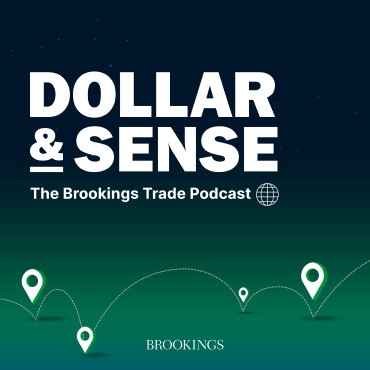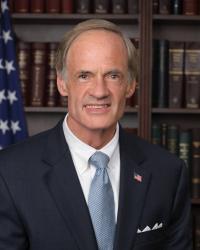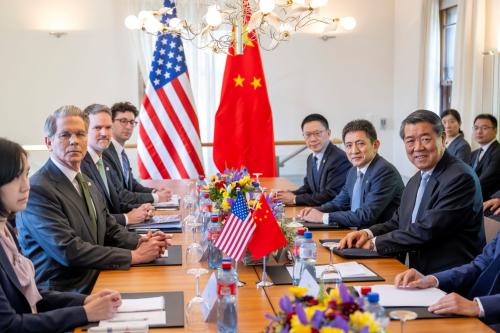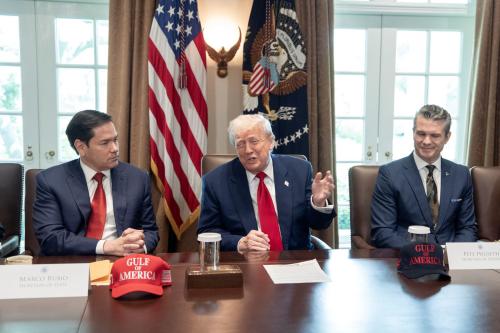Senator Tom Carper (D-DE) joins David Dollar to discuss today’s pressing issues in global trade, including the security of Hong Kong, U.S.-China economic relationship, and implementation of the USMCA. Sen. Carper emphasizes the need for bipartisan solutions to meet these challenges and argues that Congress should reclaim its authority over shaping trade policy.
Related content
Carper, Kaine Introduce Bill To Restore Congressional Oversight On Trade
What’s at stake in China’s new national security legislation for Hong Kong?
Sen. Pat Toomey on why the USMCA falls short
This transcript has been lightly edited for clarity.
DOLLAR: Hi, I’m David Dollar, host of the Brookings trade podcast, “Dollars & Sense.” Today my guest is Senator Tom Carper, Democrat of Delaware. Among other things, the senator is and members of the Senate Finance Committee which deals with trade issues. We’re going to talk about some of the key trade issues facing America and issues that Congress is dealing with. So, thank you very much for joining the show, Senator.
SEN. CARPER: David, great to see you. Thanks so much.
DOLLAR: So one of the important trade issues right now concerns Hong Kong. The United States has accorded special status to Hong Kong even though it’s part of the larger People’s Republic of China, but now that Beijing is encroaching on civil liberties there our administration is considering taking away the special status. It actually consists of a lot of different specific things – an extradition treaty, different tariffs for Hong Kong goods, we have very deep financial integration – so to some extent we can pick and choose. The challenge, it seems to me, is that we don’t want to hurt the people of Hong Kong, but we are interested in making some kind of statement and trying to influence Beijing. So can I ask: What are your views on what we should be doing with Hong Kong’s special status?
SEN. CARPER: You mentioned I serve in the Senate. I’ve been there…this is my fourth term and I get to serve on three committees: Environment and Public Works Committee; a committee called Homeland Security and Governmental Affairs; and Finance, which has broad jurisdiction over a lot of things including trade. And if you look – I have a copy of the Constitution here. Your listeners cannot see it, but I’m holding it and if I open it up to Article 1 in the Constitution it actually says that the Congress probably has a greater role in trade issues than even the president. You’ll recall our founders were concerned about having a monarch. They didn’t want that, and they ensured that they put in all these checks and balances.
But you mentioned I’m on the Finance Committee. Before I was a senator, I was a governor. I was governor for eight years and I loved being governor. You can only be governor for eight years in Delaware. Before that I was a congressman for 10 years. Before that I was state treasurer. I was treasurer when we had the worst credit rating in the country at the age of 29. I could barely say revenue anticipation note, but that’s how we funded our government in those early days. Before I did that, I got an MBA. I was in the Navy. I was a naval flight officer, and I served three tours in Southeast Asia and I’m the last Vietnam veteran serving in the United States Senate with the death of John McCain.
My crew and I were California-based, but we deployed three times. Six-month tours in Southeast Asia. We flew all the P-3 airplanes out of Vietnam in 1968 and put them in Thailand. We flew all our missions along the coast of Vietnam and Cambodia. The South China Sea – that’s where we patrolled. Low-level missions; 500 feet off to the water. And even at that time the Chinese were trying to encroach, not so much on Hong Kong but certainly on the islands; the Paracel Islands and other islands in the South China Sea. And we made sure that our presence there – Seventh Fleet by air, by sea – that we did not yield an inch to the Chinese. We were omnipresent.
I would say what’s important here is for us to […] our values. For us to make sure that we continue to have a dialog, an ongoing dialog, with the folks that are a force for resistance… a force for good. The people trying to make sure that the deal that was struck with China years ago is actually maintaining and that the Chinese live up to their words. One of the things that would be helpful is if we had an administration here who had the ability not just to dialog with the folks in Hong Kong, but also a dialogue with the Chinese–with Xi and his folks.
We made a huge mistake. We made a huge mistake when we walked away from the Trans-Pacific Partnership. We will probably come back to this several times. What a deal! Twelve nations; 40 percent of the world trade. We led it. The Chinese were on the outside looking in, and it gave us the opportunity to say to China: “If you want to continue to sell intellectual property, you want to continue to trample on people’s human rights, you want to do that stuff? You’re not going to be part of TPP. If you clean up your act and behave in a more appropriate manner, then there will be a role for you to play and we’ll all enjoy this together.”
So, to your question: one, an ongoing dialog with the folks who are fighting a very brave fight in Hong Kong. I always say, “ask your customer.” They’re our customer. What can we do to help, and follow their guidance. The other thing, too, even when it’s difficult, is to have a conversation with Xi and his people. Let’s go ahead and be sure we have it. Finally, be consistent. Be consistent. And not be…this administration believes in chaos, and that’s not really a good approach whether it’s trying to do the right thing in Hong Kong or any other place in the world.
DOLLAR: Let’s move on and talk a little bit more about China. You already brought up China and President Xi. What do you see as some of the key economic issues between the U.S. and China? You raise the idea of joining TPP. I’m very sympathetic to that as a way of trying to deal with China, but there are other possibilities as well. So how do you read U.S.-China relations on an economic front?
SEN. CARPER: They’re chaotic. If I had to think of a single word that would characterize our relationship, it’s chaos. Our president is hot and cold. He’s not consistent. He doesn’t say the same thing from day to day, week to week, or month to month. He’s got a very good man in Robert Lighthizer, his trade rep. And Robert Lighthizer succeeds another great guy who is Michael Froman who was the trade rep before that. I just had a meeting this week with the new deputy trade rep who’s going to be one of the two right-hand people for Ambassador Lighthizer. But the president, God bless him, the president doesn’t listen to his people. Lighthizer would never tell him to be hot and cold; say one thing one day; shake the sword; putting up tariffs in place and pulling them off.
We had this negotiation and the idea was – you know, this most recent negotiation that was concluded a couple of months ago – as I recall from that negotiation the tariffs were supposed to force China to make structural changes to its industrial planned economy. Remember? The issues outlined, and actually the trade rep’s Section 301 report includes, China’s dummy subsidies, technology transfers, cyber espionage, et cetera. None of these issues were actually addressed in the Phase One trade deal. None of them. So we went through all that […].
We raise a lot of corn, soybeans, and chickens in Delaware. Our farmers don’t know what to expect. It’s just no certain predictability. Other than that, David, everything’s fine.
DOLLAR: I think business in particular hates that uncertainty. You slap on the tariffs and then you take some of them off and you threaten more – it’s that uncertainty. I mean, business can live with most policies, but if you’re constantly changing them then that just makes it really hard to have a planting season or build a plant and get out ahead of this. So I gather you don’t really support this strategy of introducing the tariffs to bring China to the table?
SEN. CARPER: Well, as I mentioned, I was governor of Delaware for eight years, and I was privileged to serve as chairman of the National Governors Association (NGA) during part of that and loved being part of the NGA and loved being a governor. One of the things I focused on every day in those eight years is how do we create a more nurturing environment for job creation and job preservation.
More jobs were created in Delaware in those eight years that I was privileged to serve as governor than any eight-year period in the history of the state of Delaware. Think about that. And I did not create one of them, but I helped create that nurturing environment working with a lot of stakeholders: schools, colleges, universities, Chambers of Commerce, farm bureau, labor unions.
One of the things I have done since I was governor and even today, this week, I do customer calls. I visit businesses large and small in Delaware and I ask three questions. I’ve always asked three questions on these visits. Right now they’re virtual visits. First of all I say to the business “how are you doing?” I say, “how are we doing? We as our congressional delegation, state government, federal government – how are we doing?” And the third question I ask is “what can we do to help?” And right up to the pandemic when I’d ask, “what can we do to help?” businesses would say we need help on workforce. That was when we had like 150-160 million people going to work every day. […] They were saying we need people to show up and do this work, have the education, the work skills, et cetera. I don’t hear that anyone. What I hear…they don’t say we need workforce, what we need is predictability. And that is evergreen. I heard that for 40 years I’ve been privileged to serve in public office. Do you want to help my business? Big business and little businesses? Gave us some predictability and certainty.
I’ll never forget, David. I once had, I think was our friend Lamar Alexander, my colleague from Tennessee who’s been governor, ran for president, he’s been Secretary of Education. He’s been everything. Senator from Tennessee. We’re having this meeting with eight utility CEOs from around America and we’re talking about clean air legislation. There was one CEO from a southern utility. He said at our meeting about clean air, reducing emissions and cleaning up our air, here’s what he said: tell us – us being the utilities industry – tell us what the rules are going to be, give us a reasonable amount of time and some flexibility, and get out of the way. That’s what you need to do. That’s great advice. I’ve never forgotten that, and it’s not just for the utility industry to meet our clean air, but it’s for all industries across the board. Certainty and predictability. Those are the basics. And to ask your customers – in this case not just the environmentals, not just the businesses – but all of them.
DOLLAR: You mentioned this Phase One trade deal with China. It’s supposed to increase U.S. exports in a wide range of different areas which should be creating jobs. I have to point out that after five months, basically U.S. exports to China are down very significantly – I think by about 15 percent. You might think that’s inevitable because of the coronavirus recession, but actually China is coming out of its recession very quickly. So China’s total imports are not down, maybe down just a tiny bit, but their imports from the United States are down very significantly. So, so far, we’re not creating any jobs through this kind of approach.
Now Senator, you began by showing me a picture of the Constitution. I keep one on my living room coffee table.
SEN. CARPER: Do you really?
DOLLAR: I do. And as you say, the power to impose taxes, including taxes on trade which we call tariffs, that’s all given to Congress in the constitution. The Congress has given a lot of that authority to the president and so the president has been able to introduce these national security tariffs, other types of tariffs. You’ve joined with Senator Kaine to introduce the Reclaiming Congressional Trade Authority Act. Can you talk a little bit about what is in your act and what problem it’s trying to solve?
SEN. CARPER: Yes, and as you suggest, if you read the Constitution it’s pretty clear here that Congress has maybe an oversized role on this playing field and we have ceded that authority to the president. In some ways it’s understandable, but there is an ebb and flow here. When presidents or chief executives use this authority responsibly, maybe in consultation with the Congress, that’s one thing. When they use it irresponsibly, that’s quite another. If you look at the kind of stuff that this administration tried to do in threatening the Emergency Economic Powers Act which you’re familiar with. I worked with Tim Kaine to make sure that Congress begins to play a more appropriate role – reclaims an appropriate role – in terms of setting tariffs, not just ceding all that authority to the president. My friend Pat Toomey, my neighbor Pat Toomey up the way Pennsylvania, Pat and I basically introduced legislation called the Trade Certainly Act about a year ago. What it tries to clarify is something called the Emergency Economic Powers Act, which was never meant to be used as a trade tool. It can’t be used to impose tariffs or quotas.
I find it that in my business if you just try to do everything just with all Democrats, or you try to do legislation with all Republicans, good luck. That’s not the key to success. And there’s a guy named Rob Wallace who appeared before my Environment Public Works Committee maybe a year and a half ago. He had been nominated for a big job at the Department of Commerce to be in charge of our national parks, natural wildlife refuges, fish and wildlife. He used to be the chief of staff to Malcolm Wallop. Malcolm was a senator from Wyoming. Anyway, Rob Wallace said these words at his confirmation hearing, David. He said, “bipartisan solutions are lasting solutions.” That’s why he said, “bipartisan solutions are lasting solutions.”
I was on my e-mails last night till late at night with Bill Cassidy, Republican from Louisiana, talking about how we can work on particularly technology: testing, tracing, and so forth. I was on a similar kind of communication late last night – and when I say late last night, we were in session until like 1:30 AM last night. I got home – we drove home – I got home at 3:30 AM this morning. If I look tired, I am tired. But the reason why I’m reaching out to these guys, they’re great to work with. They know that bipartisan solutions are lasting solutions, and we need more of those. And we frankly need an administration that does a better job of reaching out to Congress. Lighthizer, Trade Rep Lighthizer, he is an ace this. He is as good…him and Michael Froman, previous trade rep, are so good at reaching out to the Congress. I applaud them both and they provide an example for everybody else.
DOLLAR: Yeah. We’ve had some really outstanding U.S. trade representatives from both parties over the years and I’ve been privileged to have a number of them on the show. In the two areas I really focus on – which is China, in particular, but then international trade more generally – we used to have a real bipartisan consensus in favor of free trade but rules-based trade and in favor of engaging China cautiously with eyes wide open. But I feel that that bipartisan consensus has really broken down on both trade and China. You mentioned Senator Toomey from Pennsylvania; he’s also been our show in the past. Do you think there’s a prospect of getting Republican support for what you and Senator Kaine have tried to do in terms of reasserting congressional authority over these national security tariffs?
SEN. CARPER: I think it’s hard to do that with this administration, but we may not always have the same president. In fact, if history is any gauge…either in six or seven months we’ll have a new president, or maybe in four years and six or seven months we’ll have a new president. You can probably guess which one I’m hoping for.
One the great things about Joe Biden is not so much a political thing. I’ve known him for forty years; I think he’s one of most decent people I’ve ever worked with. He’s really good at reaching out to Democrats and Republicans. And he took a lot of flak in the Democratic primaries for president because he was friendly with Strom Thurmond. He was friendly with Phil Gramm. He was friendly with D’Amato up in New York. But he believes that all politics is personal. He also believes that all diplomacy is personal and that you need a leader who believes that to their core and acts that way with respect to bipartisan leadership – Democrats and Republicans in the Senate. Also, with the ability to reach and have a dialog, an ongoing dialog, and some common ground with the world’s leaders – especially in places like China. It’s a hugely important relationship. They don’t play by the rules, and we need for them to play by the rules. The best way to do that is to use an entity like the Trans-Pacific Partnership to hold China at arm’s length. You can’t be a part of this until you clean up your act. That’s the way to treat them. The other thing is to develop a dialog and always have a back-channel dialog.
I think we have a great ambassador over there. We’ve got Terry Branstad, governor from Iowa – governor for life I used to call him. We served together for many years. Before that we had Max Baucus who was a great senator. We need people on the ground in China who have the kind of connections and can build those kinds of relationships. With Max and also with Terry Branstad we have those people.
DOLLAR: You know, Senator, I lived in Beijing for nine years. The first five of those was representing the World Bank, but then I was recruited by Tim Geithner to represent the Treasury during the first Obama administration. I worked very closely with Ambassador Huntsman and Gary Locke. I think I made it through three different ambassadors, if I remember correctly.
There’s actually a lot of impressive American talent on the ground in China in that Beijing Embassy. It’s a microcosm of the whole U.S. government.
SEN. CARPER: Oh my God.
DOLLAR: The USTR guy we had when I was there, I mean, his spoken Chinese was so perfect. You would have thought he was Chinese, but he was Caucasian.
SEN. CARPER: It could have been a mole. He could have been a mole, David. You never know.
DOLLAR: Well, you know, he’d been working for the US government for decades.
SEN. CARPER: I know. I’m just kidding.
DOLLAR: Can I change the subject a little bit and bring up the USMCA? This is the new-NAFTA. It’s going into effect I think very soon on July 1st. I’m interested in your general assessment since Canada and Mexico are our biggest trading partners, but I also know that you and Senator Grassley, I believe, and Senator Wyden had urged USTR try to delay. I think they’re going ahead, but I wonder, what are your concerns about introducing the new rules of USMCA in the middle of our pandemic – our pandemic recession I think we could call it.
SEN. CARPER: I think the approach should not be a light switch, but maybe a dimmer switch, and to turn it up at a reasonable speed not all at once.
I want to go back. Three years ago, Robert Lighthouse had been nominated to be our trade rep – three and a half years ago – by a newly elected president, Donald Trump. He was nice enough to come and see me and to talk about his nomination, who he was. I said to him: Michael Forman is in this job right now – this was right after the election – you ought to get him on your speed dial and work with him. And I said, the other thing is don’t throw the baby out with the bathwater with respect to TPP. And if you want to renegotiate NAFTA, do it in the context of TPP. You’ve already got a head start, and it involves China, but it also involves our friends in Canada and Mexico. And I thought foolishly we threw it away.
Tom Friedman, who writes books and columns for New York Times, has something he calls the Trump Doctrine. It goes something like this: “Barack built it; I, Trump, broke it; you fix it.” Think about that. Barak built it; I, Trump, broke it; you fix it. And one of the things that they broke was TPP. And what they tried to do was to come back and piecemeal it with NAFTA 2.0, the USMCA. Is it better than nothing? It certainly is. Is it as good as what we had with the TPP? I don’t think even close.
Two of my colleagues – Chuck Grassley, chairman of the Finance Committee, and Ron Wyden, senior Democrat on the Finance Committee – we had reached out. We joined together in a letter to Ambassador Lighthizer earlier this year to say that we should be going a little bit slower because there’s a lot to swallow here for our businesses and those that have to comply with these new guidelines and rules. We asked for maybe a couple of extra months to allow that to happen. I think we got maybe a month – to slow down and hit the pause button for maybe a month. It wasn’t quite as long as we thought was appropriate, but at least it was bipartisan and that we had the right message to the trade rep. He tried to meet us halfway and you can’t always get everything you want. But if you try sometimes you can get what you need.
DOLLAR: I’m old enough to get that reference. And I very much agree with you, Senator, that TPP wasn’t perfect but it had a lot of good features. It’s got a lot of rules and regulations that address concerns we have with China. So China is not part of that club, but if they want to aspire to join they would have to raise their standards. Then we brought a lot of that TPP agreement into the new NAFTA, which is fine, but we had the agreement with 11 countries and then we reduced it to just two countries: Canada and Mexico. So, that did not particularly make sense.
I wanted to end by going big picture, Senator. I was going to give you a chance to talk about TPP. You’ve talked about it a fair amount. We’re in a presidential election year. What do you think the role of trade will be in the election? What are the trade issues the American people should care about? I don’t know if you’d care to speculate on whether a President Biden might consider rejoining TPP and is there momentum developing within the Democratic Party to come back into TPP?
SEN. CARPER: As I said earlier I’ve had the privilege of knowing Joe Biden for a long time. I served with him when I was a congressman, when I was governor, and as a U.S. senator when he became vice president. The key to success in anything I’ve ever been a part of is always leadership. I don’t care of it’s a college or university, I don’t care if it’s a sports team, I don’t care if it’s a business, a government, a state, or a country. The key is always leadership. And leadership is a lot of different things. Leadership is the courage to do what’s right and keep out-of-step when everyone else is marching to the wrong tune. Leadership is surrounding yourself with the best people you can find, and when the team does well, giving the team the credit. Leadership is treating other people the way you want to be treated. And leadership is building bridges, not walls, to unite, not divide. Leadership is – there’s a guy named Camus who used to be a French philosopher and he used to say, “leaders are purveyors of hope.” And when I think of leadership, and I think of those qualities, I think of Joe Biden. He and I don’t agree on every single thing – we don’t. But I think that he has the kind of leadership qualities that we need in this point in our nation’s history.
I look forward to working, hopefully, with him in that role, and I especially look forward to the kind of people that he surrounds himself with. Wonderful people. I’ve known…for about 40 years I’ve known the people around him. Decent, kind, thoughtful, hardworking, honorable people with great values. People don’t always say “well who are you going to surround yourself with? Who are you going to have beside you in the White House?”
The other thing that’s like a special bonus – he always says he married up. Jill Biden, Dr. Jill Biden, I knew her when she was a high school teacher. She taught English in Brandywine School District here in Delaware. I know her when she was teaching our community college, Del Tech. I knew when she was at the University of Delaware. To have somebody as smart as she is in the White House by his side – it’s like a bonus. A real bonus for our country. So it’s a great team.
We’ll see how it works out. It’s a long ways from here to November, but I’m feeling good. Another musical reference: I’m picking up a good vibration. And we’ll see how it ends up, but it’d be nice to get back to somewhat more like a normal arrangement and somebody who really, truly believes that bipartisan solutions are lasting solutions and is pretty good at reaching out across the aisle. We could use that, and I yearn for that day.
DOLLAR: Yeah, it would be great if we can get back to a bipartisan consensus on free trade, expanding the U.S. economic role in the world.
So I’m David Dollar and I’ve been talking to Senator Tom Carper, Democrat of Delaware, about key trade issues for the U.S. and some of the issues that Congress is facing. It’s been a real pleasure talking to you, Senator. Thank you for giving us the time.
SEN. CARPER: Great to be with you today. Thanks so much. Take care.
DOLLAR: Thank you all for listening. We’ll be releasing new episodes of Dollar & Sense every other week, so if you haven’t already, make sure to subscribe on Apple Podcasts or wherever else you get your podcasts and stay tuned. Dollar & Sense is a part of the Brookings Podcast Network. It wouldn’t be possible without the support of Shawn Dhar, Anna Newby, Fred Dews, Chris McKenna, Gaston Reboredo, Camilo Ramirez, Emily Horne, and many more.
If you like the show, please make sure to rate it and leave us a review. Send any questions or episode suggestions to [email protected]. And, until next time, I’m David Dollar and this has been Dollar & Sense.
The Brookings Institution is committed to quality, independence, and impact.
We are supported by a diverse array of funders. In line with our values and policies, each Brookings publication represents the sole views of its author(s).







Commentary
PodcastSen. Tom Carper on the trade issues confronting America
June 15, 2020
Listen on
Dollar and Sense Podcast